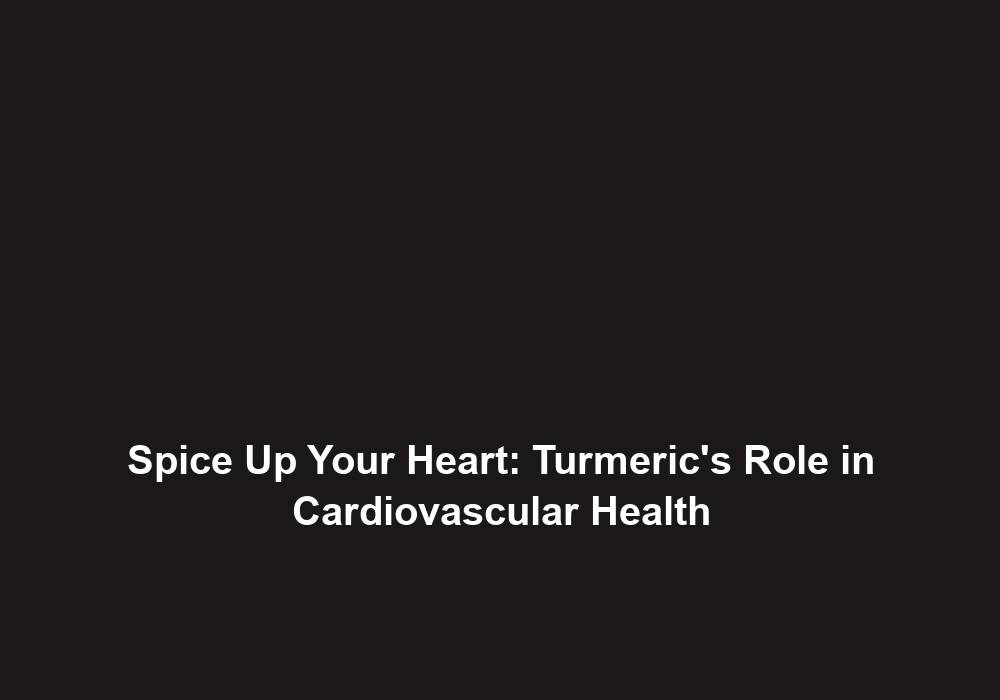Spice Up Your Heart: Turmeric’s Role in Cardiovascular Health
Turmeric, a vibrant yellow spice commonly found in Indian and Asian cuisines, has gained significant attention in recent years for its potential health benefits. While it is widely known for its anti-inflammatory and antioxidant properties, studies have also shown that turmeric may play a crucial role in promoting cardiovascular health. In this article, we will explore the various ways in which turmeric can spice up your heart and contribute to a healthier cardiovascular system.
The Power of Curcumin
The key component of turmeric that is responsible for its health benefits is curcumin. Curcumin is a bioactive compound that possesses powerful antioxidant and anti-inflammatory properties. These properties can help combat oxidative stress and inflammation, both of which are closely linked to the development of cardiovascular diseases.
Curcumin’s antioxidant properties allow it to neutralize free radicals in the body, which can damage cells and contribute to the development of heart disease. By reducing oxidative stress, curcumin helps protect the heart and blood vessels from damage.
Additionally, curcumin’s anti-inflammatory properties can help reduce inflammation in the body, including inflammation in the arteries. Chronic inflammation is a major contributor to the development of atherosclerosis, a condition characterized by the buildup of plaque in the arteries. By lowering inflammation, curcumin helps promote healthier arteries and reduces the risk of plaque formation.
Furthermore, curcumin has been found to have anti-thrombotic properties, meaning it can help prevent the formation of blood clots. Blood clots can block blood flow to the heart or brain, leading to serious cardiovascular events such as heart attacks and strokes. By inhibiting platelet aggregation and reducing the likelihood of blood clot formation, curcumin helps maintain healthy blood circulation and reduces the risk of clot-related complications.
Lowering Cholesterol Levels
High levels of cholesterol in the blood can increase the risk of heart disease. Curcumin has been shown to have a positive impact on cholesterol levels by reducing the levels of LDL (bad) cholesterol while increasing the levels of HDL (good) cholesterol. This helps promote a healthier lipid profile and reduces the risk of plaque formation in the arteries.
Curcumin achieves this by inhibiting the activity of enzymes involved in cholesterol synthesis in the liver. By reducing the production of LDL cholesterol, curcumin helps lower overall cholesterol levels and supports cardiovascular health. Additionally, curcumin has been found to increase the expression of genes that enhance the clearance of cholesterol from the body, further contributing to its cholesterol-lowering effects.
Reducing Inflammation
Chronic inflammation is a significant contributor to the development of cardiovascular diseases such as atherosclerosis. Curcumin’s potent anti-inflammatory properties can help lower inflammation markers in the body, reducing the risk of plaque buildup and improving overall cardiovascular health.
Inflammation plays a key role in the development and progression of atherosclerosis. It triggers the release of inflammatory molecules, which promote the adhesion of immune cells to the arterial walls and the accumulation of cholesterol. Over time, this can lead to the formation of plaque and the narrowing of the arteries.
Curcumin inhibits the activity of various inflammatory enzymes and molecules involved in the inflammatory response. By doing so, it helps reduce the production of inflammatory substances and prevents excessive immune cell adhesion. This helps maintain the integrity of the arterial walls and reduces the risk of atherosclerosis.
Moreover, curcumin has been shown to modulate the activity of transcription factors involved in the regulation of inflammation. By interfering with the activation of these factors, curcumin helps suppress the expression of pro-inflammatory genes and reduces the overall inflammatory response in the body.
Preventing Blood Clots
Blood clot formation can lead to serious cardiovascular events such as heart attacks and strokes. Turmeric has been found to have antiplatelet and anticoagulant properties, which means it can help prevent abnormal blood clot formation. By keeping the blood flowing smoothly, turmeric reduces the risk of clot-related complications.
Platelets are small cells in the blood that play a crucial role in blood clotting. When an injury occurs, platelets aggregate at the site of injury to form a clot and stop bleeding. However, excessive platelet aggregation can lead to the formation of unwanted blood clots within the blood vessels.
Curcumin inhibits platelet aggregation by interfering with various signaling pathways involved in the process. It reduces the activation of platelets and prevents them from sticking together, thereby preventing the formation of blood clots. Additionally, curcumin has anticoagulant properties, meaning it can help prevent the blood from clotting too easily.
By inhibiting platelet aggregation and reducing the risk of abnormal blood clot formation, turmeric helps maintain healthy blood flow and reduces the likelihood of cardiovascular complications.
Enhancing Endothelial Function
The endothelium is the thin layer of cells that lines the interior of blood vessels. It plays a crucial role in maintaining proper vascular function. Dysfunction of the endothelium is a significant factor in the development of cardiovascular diseases. Curcumin has been shown to improve endothelial function by increasing nitric oxide production, a molecule that helps relax and dilate blood vessels, thus improving blood flow and reducing blood pressure.
Endothelial dysfunction is characterized by impaired nitric oxide production and reduced vasodilation, which can lead to high blood pressure and compromised blood flow. By increasing nitric oxide production, curcumin helps restore endothelial function and promotes healthy blood vessel function.
Nitric oxide is a potent vasodilator that relaxes the smooth muscles in the blood vessel walls, allowing for increased blood flow. It also helps prevent the adhesion of platelets and immune cells to the endothelium, reducing the risk of plaque formation and inflammation.
Curcumin enhances nitric oxide production by activating the enzyme responsible for its synthesis. This leads to improved vasodilation, reduced blood pressure, and better overall cardiovascular function.
Antioxidant Protection
The oxidative damage caused by free radicals is a major contributor to cardiovascular diseases. Turmeric’s high antioxidant content, particularly curcumin, helps neutralize free radicals and protects against oxidative stress. By reducing oxidative damage to the heart and blood vessels, turmeric supports cardiovascular health.
Free radicals are unstable molecules that can cause damage to cells and tissues through a process called oxidative stress. When free radicals outnumber the body’s antioxidant defenses, oxidative stress occurs, leading to cellular damage and inflammation.
Curcumin acts as a potent antioxidant by neutralizing free radicals and preventing their harmful effects. It scavenges free radicals, stabilizes them, and reduces their ability to cause oxidative damage. By protecting against oxidative stress, curcumin helps maintain the health of the cardiovascular system.
Additionally, curcumin stimulates the production of endogenous antioxidants, such as glutathione, which further enhances the body’s defense against oxidative stress. This helps maintain the balance between free radicals and antioxidants and reduces the risk of oxidative damage to the heart and blood vessels.
Managing Hypertension
Hypertension, or high blood pressure, is a leading risk factor for heart disease and stroke. Studies have indicated that curcumin may help lower blood pressure by relaxing blood vessels, improving blood flow, and reducing the force against arterial walls. Incorporating turmeric into your diet may contribute to better blood pressure management and overall heart health.
High blood pressure puts strain on the arteries and forces the heart to work harder to pump blood throughout the body. Over time, this can lead to damage to the blood vessels and increase the risk of cardiovascular diseases.
Curcumin has been found to have vasodilatory effects, meaning it helps relax and widen blood vessels, resulting in improved blood flow and reduced blood pressure. It achieves this by increasing the production of nitric oxide, a molecule that dilates blood vessels and promotes proper circulation.
Moreover, curcumin has been shown to inhibit the activity of enzymes involved in the regulation of blood pressure. By interfering with these enzymes, curcumin helps reduce the force against arterial walls and lowers blood pressure.
Tips for Including Turmeric in Your Diet
Now that we understand the potential cardiovascular benefits of turmeric, let’s explore some practical ways to incorporate it into our daily diet:
-
Golden Milk: Prepare a warm and comforting drink by combining turmeric with milk (or plant-based milk) and adding a touch of honey or other natural sweeteners. This delicious beverage can be enjoyed before bed or as a soothing treat throughout the day.
-
Curry Dishes: Turmeric is a staple ingredient in many curry recipes. Experiment with different spices and vegetables to create flavorful and heart-healthy dishes. Try adding turmeric to lentil curries, vegetable stir-fries, or roasted cauliflower for a burst of flavor and added health benefits.
-
Smoothies: Add a teaspoon of turmeric powder to your favorite smoothie recipe for an antioxidant boost. Combine it with fruits like mango, pineapple, or banana, and add some spinach or kale for an extra nutritional punch. Don’t forget to include a source of healthy fats, such as almond butter or coconut oil, to enhance the absorption of curcumin.
-
Salad Dressing: Mix turmeric with olive oil, lemon juice, and your favorite herbs to create a delicious and nutritious salad dressing. Drizzle it over a bed of mixed greens, cherry tomatoes, cucumber, and avocado for a refreshing and heart-healthy salad.
-
Turmeric Tea: Steep turmeric slices or powder in hot water and enjoy a soothing cup of turmeric tea. You can enhance the flavor by adding a squeeze of lemon or a sprinkle of cinnamon. This warm and comforting beverage is perfect for relaxing and reaping the benefits of turmeric.
Remember, the bioavailability of curcumin can be enhanced by consuming it with black pepper and healthy fats, such as olive oil or coconut oil. Additionally, curcumin supplements are available for those who may find it challenging to incorporate turmeric into their daily meals.
Conclusion
Turmeric’s active compound, curcumin, has shown immense potential in promoting cardiovascular health. From reducing inflammation and cholesterol levels to enhancing endothelial function and preventing blood clots, turmeric can spice up your heart and contribute to a healthier cardiovascular system. By incorporating turmeric into your daily diet, you can harness its numerous benefits and take a proactive approach towards maintaining a healthy heart. So why not start adding a pinch of turmeric to your favorite recipes and spice up your heart today?
Disclaimer: The information provided in this article is for educational purposes only and should not replace professional medical advice. It is always recommended to consult a healthcare professional before making any significant changes to your diet or lifestyle, especially if you have an existing medical condition.







